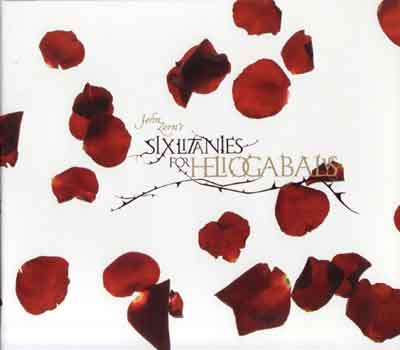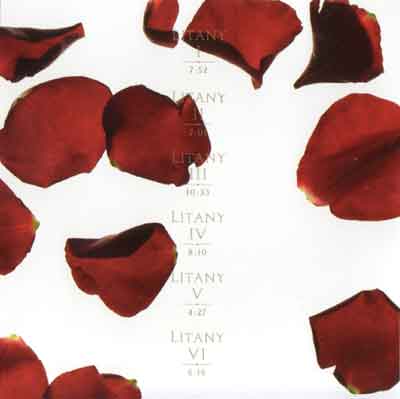JOHN ZORN




1/ Litany I (Zorn) 7.52
2/ Litany II (Zorn) 7.01
3/ Litany III (Zorn) 10.33
4/ Litany IV (Zorn) 8.10
5/ Litany V (Zorn) 4.27
6/ Litany VI (Zorn) 6.16
Recorded at Orange Music Studios, New Jersey by Bill Laswell
Mix Translation: Bill Laswell
Engineer: Bob Musso
Assistant: James Dellatacoma
Conceived, composed, arranged and conducted by John Zorn
Associate Producer: Kazunori Sugiyama
Mastered by Scott Hull
Mike Patton: voice; Jamie Saft: organ; Ikue Mori: electronics; John Zorn: alto sax; Trevor Dunn: bass; Joey Baron: drums;
CHORUS - Martha Cluver, Abby Fischer and Kirsten Sollek.
2007 - Tzadik, (USA), TZ 7361 (CD)
Note: Bill Laswell does not play on this recording.
Like so much of his work, Six Litanies blends improvisation and composition in a unique manner. In this case, John Zorn composed some of the music and conveyed the rest of the performers orally, directing their improvisation. This is no different from Moonchild and Astronome (the other two of his works with Patton, Dunn, and Baron), however. So what is it that makes Six Litanies not just a great CD overall, but the best of the three? Well, whereas the other two consisted only of Baron’s drumming, Dunn’s distorted bass, and Patton’s manic vocals, this one sees Zorn expanding the sound, adding Ikue Mori on electronics, Jamie Saft on organ, and a female trio on vocals, in addition to playing the saxophone himself. Thus, whereas on Moonchild and Astronome the softer sections often seemed sparse and occasionally even a tad dead, here they come to life with atmospheric vocals and organ, creating textures that make sure it never gets boring. Also, because this is the third CD in the series, the performers are better able to sustain the improvisations, and Zorn has worked out some of the (admittedly minor) compositional kinks that appeared on the first two in the series.
The end result is a fantastic CD. The heavy riffing sections combine Zorn’s stunning intelligence and critical thinking skills with the sheer bone-crushing power of metal, showcasing the greatest aspects of both. The softer sections, as I have noted, carry themselves perfectly, providing relief for the listener and advancing the “plot” of the music at the same time (a rare yet refreshing combination). The most interesting parts for me, however, are the improvisational sections where the performers really let loose. There’s nothing quite like hearing an organ pounding with the intensity of a guitar whose amp is on 11, drums played by a squid, bass that could replace the guitars in Meshuggah, and a saxophone that’s free-jazzing on acid all going at the same time, with, of course, Patton going apeshit over the top of it all. Of course, it’s not all like that: “Litany IV” is purely a vocal solo for Patton, who showcases his unique vocal stylings in full force, running through the gamut of all the many ways he can manipulate his voice (though forgoing some of the more disgusting ones that made for some awkward moments on Astronome). “Litany IV” is one of those things that so often gets described as “a good idea that just doesn’t sound good,” except that in this case it sounds fantastic. And the rest of the album is just as good, if not better.
There’s really not much more to be said about this release. It’s a masterpiece from start to finish and probably the greatest CD of 2007. In terms of a genre, the only way I can think to classify this is as extreme-free-cool-jazz-metal-with-Mike-Patton, but even that fails to indicate everything this album does so well. It’s probably not a great starting place into the world of John Zorn (I’d recommend IAO for that), but it ultimately stands up as one of his very best works. Only for the very open-minded or lovers of extreme avant-garde. If you are either of those, however, there can be no better CD for you.
A Rating
Pnoom (courtesy of the Progressive Ears website)
In the liner notes to Moonchild, Zorn asserts that record is the "first realization of a project that has been gestating for over three years", a combination of composition and improvisation in a rock format. For that record, he assembled a trio to record freewheeling avant-hardcore sort of stuff-- vocalist Mike Patton, bassist Trevor Dunn and drummer Joey Baron. The music on both Moonchild and Astronome was fierce and powerful yet somehow quite agile. It also set expectations for "Six Litanies for Heliogalabus", the third record in this series, but this one is entirely different.
Augmenting the Moonchild trio with the composer on alto sax, Jamie Saft on organ, Ikue Mori on laptop electronics, and a trio of female vocalists (Martha Cluver, Abby Fischer and Kirsten Sollek) serving as a chorus, "Six Litanies..." is significantly more than its predecessors, in many ways, it's the culmination of Zorn's work (barring Masada) over the past few years.
Trading with the hardcore of Moonchild (with Zorn and occasionally Saft joining in to augment) are passages of exotica-tinged organ music reminiscent of the work on The Gift (one could just hear how Ribot would wail over the top of parts of this), haunting, droning sounds with whispered vocals not unlike parts of IAO: Music In Sacred Light and interspersed vocal chorus passages that could have been lifted straight from "Frammenti del Sappho" from last year's Mysterium. It's quite a shock when the explosive hardcore sounds yield to a three-part, sustained, wordless vocal, with nothing but a flutter from Ikue Mori to signal the transition, but like the best of Zorn's work, it all fits together. It all flows from part to part and piece to piece, and throughout, Zorn seems to get nothing but stunning performances out of his musicians (including an extended solo voice performance from Patton on "Litany IV" where he pulls out everything from sounds of vomiting to screeches, screams, chirping, blowing and even some downright fantastic falsetto singing).
A couple quick notes about the presentation-- this record just sounds fantastic-- Zorn produced himself and brought in Bill Laswell on the mix and both did a fantastic job. The CD is housed in a small hard cardstock envelope contained as part of a mini-LP sleeve with the artwork displaying rose petals on a white background. It's actually quite a nice looking product.
There's a lot to love here-- Zorn and Patton's call and response at the beginning of "Litany II", Zorn leading Dunn and Baron on a freewheeling improv that ranks among the best of his frantic work on "Litany V" (where somehow all the elements of the rest of the record seem to come together), Saft just wailing on exotica sounds throughout the record, or the downright haunting droning organ and whispered vocals in "Litany III" are the best examples that come to mind. And really it makes for quite a listen, constantly unexpected and intriguing. If you like your music adventerous, this one's for you. Highly recommended.
5 stars out of 5
Michael Stack (courtesy of the Amazon.com website)
To begin, I feel I must inform the reader that I am, by no means, an authority on John Zorn or any of his projects. In fact, the only John Zorn album I own other than "Six Litanies for Heleiogabalus" is "Naked City," providing me with the relative advantage of reviewing this wonderful album totally on its own merits, and not in the context of previous releases. Regardless to the extent that the listeners musical horizon is used to brash dissonance and stark contrasts, nothing outside of John Zorn's catalogue, (nor within it, as far as I know) can prepare you for the experience that "Six Litanies..." delivers. What we are treated to with this release is an odd barrage of noise, weeping organs, almost medieval choral arrangements with a twist of modern minimalism, and of course, Mike Patton.
For the sake of the unprepared listener, it is quite unfair to call "Six Litanies..." Patton's best vocal performance. I bought this album solely on that premise and being a big Mr. Bungle fan, I expected Patton to experiment, but to experiment while singing. Mike Patton does not sing, in the conventional sense, on this album. What you will hear protruding from Patton's versatile vocal chords is a quite cacophonous serving of everything he is capable of doing besides singing, including wordless, screams, shrieks, babbles, chatters, laughs, coughs, screeches and clicks. If this doesn't sound like something you can stomach, then do not purchase this album. There is an 8 minute solo vocal track right in the middle of the album consisting solely of Patton's inhuman nonsense. The absolute unconventionality that Patton's vocals bring to the table bring down this release a bit for me. The cacophony that is Patton is effective for experimentations sake, but is simply not that enjoyable. If you are capable of overlooking this unconventional and inaccessible feature however, you will be rewarded.
After you become accustomed to Patton's unusual vocal approach, it will be easier to appreciate all the other many wonderful things about "Six Litanies..." John Zorn's alto sax attacks surprisingly do not show up as much as I had expected. When they do they are in the noise-experiment sections, and are completely atonal. The noisy parts are largely driven-besides by Patton's vocal assault and Trevor Dunn's distorted and heavy bass riffs. There are several moments where Dunn's bass lines actually begin to groove into a more straightforward beat, adding some diversity into the chaos. The aspect of this album that really makes the chaos shine are the contrasting, slower, atmospheric moments. Absolutely brilliant minimalist work by Jamie Saft (Organ), Ikue Mori (Electronics), and the chorus displaying the beautiful voices of Martha Cluver, Abbey Fischer, and Kirsten Sollek, really turn this album into something completely captivating. While the slower parts are utterly simple compared to the impossible complexity of the dissonant movements, they are nevertheless extremely atmospheric and creepy. Forlorn voices intertwine with mournful organ dirges accented by Ikue Mori's Edgard Varse-influenced electronic soundscaping to create an unusual and original masterpiece in a modern age where it seems that all musical ideas have been mastered. "Six Litanies..." Is definitely a necessity to lovers of experimental music.
5 stars out of 5
Avernus "Ogne Speranza, Voi Ch'intrante" (courtesy of the Amazon.com website)